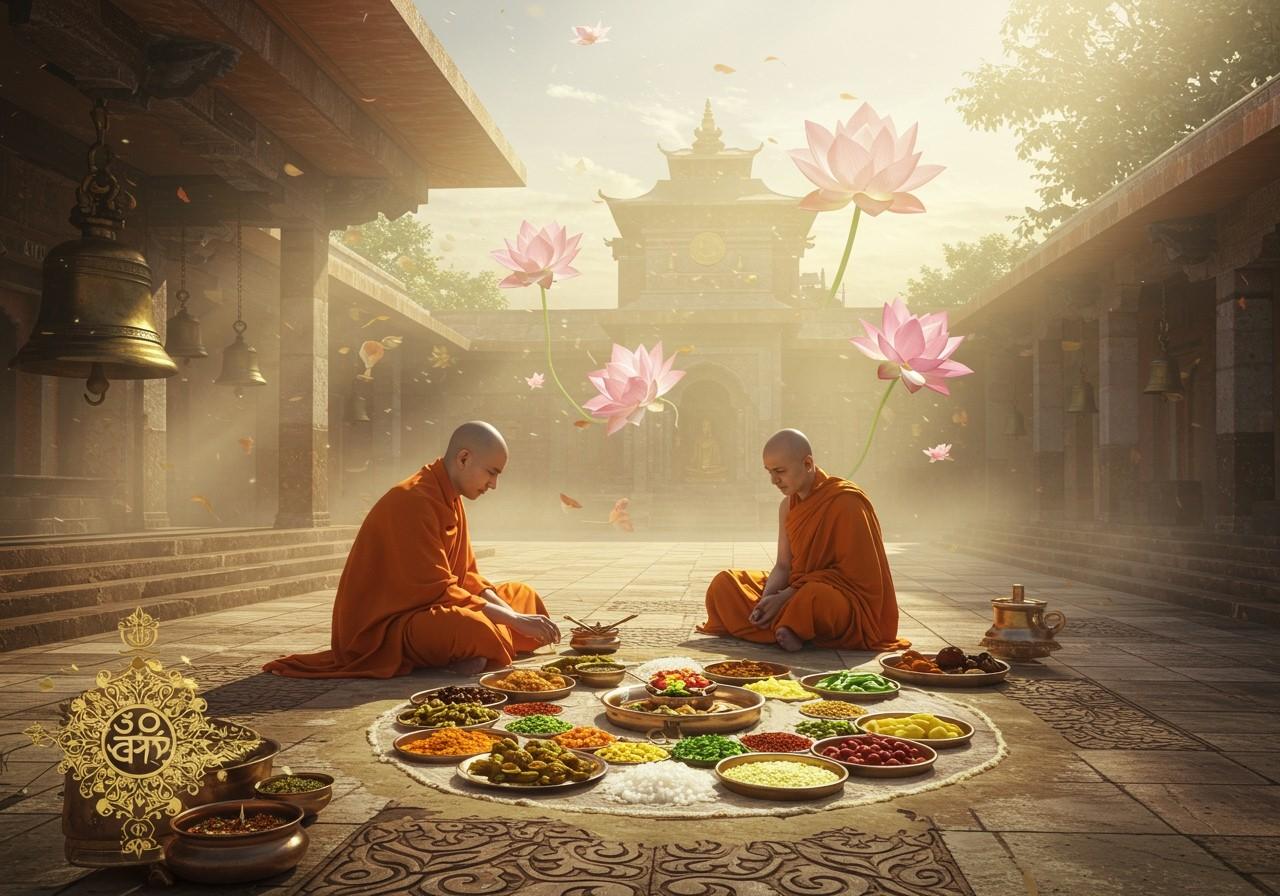
Buddhism, a major world religion, encompasses a diverse range of dietary practices and beliefs reflecting its core spiritual principles. This guide explores whether Buddhists eat meat, the prevalence of vegetarianism, and the reasons behind these choices, offering valuable insights for culturally rooted Indians who appreciate tradition and authenticity.
Can Buddhists Consume Meat?
Perspectives on meat consumption vary within Buddhism:
Theravada Tradition
Practiced in Sri Lanka, Thailand, and Myanmar, Theravada Buddhists may consume meat if it wasn’t specifically killed for them. This tradition often incorporates meat into daily meals.
Mahayana Tradition
Predominantly in East Asian nations like China and Japan, Mahayana Buddhism emphasizes vegetarianism. Avoiding meat upholds the principle of non-violence (‘ahimsa’).
Vajrayana Tradition
Tibetan Buddhism, under the Vajrayana tradition, often includes meat due to geographic and climatic limitations on vegetable cultivation. Meat provides essential nutrition in harsh environments.
The First Precept: Ahimsa
The ethical guideline of ‘ahimsa’ (non-violence) significantly influences dietary choices. Buddhists strive to minimize harm to all beings, often leading to avoiding meat.
The Threefold Rule
This rule permits meat consumption if the animal’s death wasn’t witnessed, heard, or suspected to be specifically for the consumer, minimizing direct responsibility for taking a life.
Monastic Codes
Monks and nuns adhere to Vinaya rules, accepting alms food without specific requests. Their diet depends on offerings, which may include meat.
Cultural Variations
Dietary habits vary regionally. Japanese Buddhism features many vegetarian dishes, while meat consumption is more common in parts of Southeast Asia, reflecting local customs.
Are Buddhists Vegetarian?
The prevalence and reasons for vegetarianism among Buddhists are multifaceted:
Historical Context
Vegetarianism in Buddhism dates back to early teachings emphasizing non-violence. Early texts indicate the Buddha’s preference for a plant-based diet.
Influential Figures
Figures like the Dalai Lama, while not strictly vegetarian, advocate reducing meat consumption for ethical reasons, influencing many followers.
Regional Practices
Indian Buddhists often follow vegetarianism. Chinese Buddhism has “zhai cai,” a rich vegetarian cuisine, and Japan’s “shojin ryori” (temple food) is entirely plant-based.
Modern Movements
Contemporary movements within Buddhism promote vegetarianism to combat animal cruelty and environmental damage, advocating for plant-based diets as a compassionate choice.
Ritual and Festivals
Vegetarianism is observed during specific events. For instance, the Ullambana Festival in China involves abstaining from meat to honor ancestors.
Health and Spirituality
Many Buddhists believe a vegetarian diet promotes physical and spiritual well-being, aiding meditation and mindfulness practices.
Ethical and Compassionate Living
Vegetarianism aligns with Buddhist principles of compassion and ethical conduct, expressing non-violence and kindness.
Why Do Some Buddhists Eat Meat?
Several factors contribute to meat consumption among some Buddhists:
Practical Considerations
In harsh climates like Tibet, meat is a practical necessity due to limited agricultural options and nutritional needs.
Cultural Influences
Cultural and familial traditions impact food choices. Meat consumption is deeply ingrained in some cultures’ rituals and social norms.
Scriptural Interpretations
Varying interpretations of Buddhist scriptures allow for meat consumption under specific conditions.
Monastic Life
Monks and nuns rely on alms food, which may include meat. They accept offerings without preference to avoid pickiness and waste.
Historical Practices
Historically, meat consumption was accepted or necessary in certain contexts, like during long journeys where monks relied on local food.
How Poojn.in Supports Buddhist Dietary Practices
Poojn.in offers a range of products aligning with Buddhist dietary needs:
- Pure, naturally sourced spices: Find authentic spices to enhance vegetarian meals.
- Vegetarian-friendly ingredients: Access a variety of ingredients suitable for Buddhist diets.
- Items for mindful food preparation: Discover tools and utensils that promote mindful cooking practices.
- Traditional cooking implements: Explore traditional cooking equipment for preparing authentic Buddhist cuisine.
Poojn.in provides high-quality, responsibly sourced products for Buddhist practitioners, respecting mindfulness and non-harm principles. Shop Buddhist-friendly items at Poojn.in.
Note: Check our website for current product availability and pricing.
Conclusion
Buddhist dietary practices are diverse, reflecting a commitment to ethical living and non-violence. From Mahayana’s emphasis on vegetarianism to Vajrayana’s practical meat consumption, each approach honors these principles. Understanding this diversity offers valuable insight into Buddhist traditions.
Respecting dietary choices means recognizing the influence of local customs, historical contexts, and individual interpretations. Appreciating this diversity allows us to honor the rich tapestry of Buddhist traditions, connecting with the spiritual and ethical foundations of compassion and mindful living. Poojn.in offers a range of products to support various Buddhist dietary practices, reflecting our commitment to serving the diverse needs of this community.
FAQs on Buddhist Dietary Practices and Beliefs
Can Buddhists eat meat? Yes, some Buddhists consume meat, while many adopt vegetarianism to avoid harming animals. Practices vary among schools and traditions.
Are all Buddhists vegetarian? Not all Buddhists are vegetarian. Some schools encourage vegetarianism, while others allow meat if the animal wasn’t killed specifically for them.
Why do some Buddhists eat meat? Practical reasons, cultural traditions, and specific scriptural interpretations contribute to meat consumption among some Buddhists.
What foods are typically avoided? Many avoid foods involving killing animals. Some also refrain from onions, garlic, and strong spices believed to hinder meditation.
Do Buddhist monks eat meat? In some traditions, monks consume offered meat without preference, adhering to Vinaya rules of accepting alms food.
How does Buddhism view eating meat? Buddhism views it as a personal choice, with some teachings advising against it for compassion, while others leave it to individual discretion.
What’s the significance of vegetarianism? Vegetarianism is often seen as a way to practice compassion and non-violence, minimizing harm to living beings.
Are there special dietary practices during Buddhist festivals? Yes, some festivals involve fasting or vegetarian meals to enhance spiritual practice.


